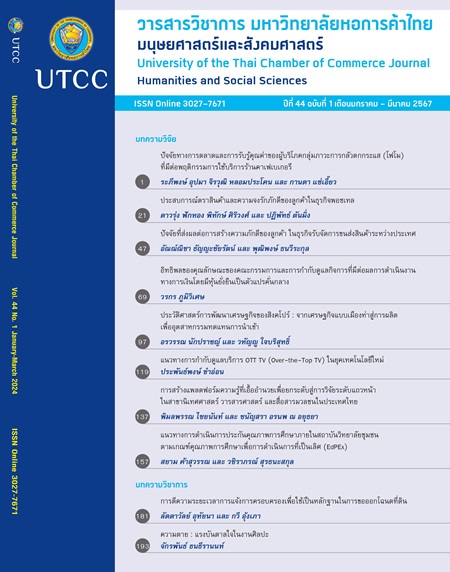แนวทางการกำกับดูแลบริการ OTT TV (Over-the-Top TV) ในยุคเทคโนโลยีใหม่
Main Article Content
บทคัดย่อ
จากการพัฒนาและเปลี่ยนแปลงเทคโนโลยีอย่างรวดเร็ว บริการ OTT TV ได้เข้ามาเป็นคู่แข่งที่สำคัญในกิจการกระจายเสียงและกิจการโทรทัศน์ ทำให้ผู้ให้บริการโทรทัศน์ทั่วโลกจำเป็นต้องปรับตัวให้เท่าทันกับการเปลี่ยนแปลงดังกล่าว เนื่องจากผู้ให้บริการ OTT TV ไม่มีต้นทุนในการลงทุนในเครือข่ายเพราะอาศัยโครงสร้างพื้นฐานของผู้ให้บริการโครงข่ายที่มีอยู่เดิม เช่น โครงข่ายโทรศัพท์เคลื่อนที่ และโครงข่ายอินเทอร์เน็ตบรอดแบนด์ ทำให้บริการ OTT TV มีความได้เปรียบในการแข่งขัน สำหรับประเทศไทยแล้ว ผู้ให้บริการ OTT TV ยังไม่มีสถานะเป็นผู้รับใบอนุญาตภายใต้การกำกับดูแลของสำนักงานคณะกรรมการกิจการกระจายเสียง กิจการโทรทัศน์ และกิจการโทรคมนาคมแห่งชาติ (กสทช.) จึงอาจก่อให้เกิดความไม่เท่าเทียมกันในการแข่งขันเมื่อเปรียบเทียบกับผู้รับใบอนุญาตที่เป็นผู้ให้บริการโทรทัศน์แบบดั้งเดิมที่มีต้นทุนในการลงทุนในโครงข่าย ถูกกำกับดูแลเนื้อหา และถูกเรียกเก็บค่าภาษีและค่าธรรมเนียมต่างๆ ที่เกิดขึ้นจากการประกอบกิจการ การวิจัยนี้มีวัตถุประสงค์เพื่อศึกษาวิเคราะห์และเปรียบเทียบกฎหมาย นโยบาย และแนวปฏิบัติที่เกิดขึ้นจริงในต่างประเทศ รวมถึงบริบทที่เกี่ยวข้องกับการกำกับดูแลการให้บริการ OTT TV เพื่อให้ข้อเสนอแนะเชิงนโยบายสำหรับประเทศไทย ผลการศึกษาพบว่าหน่วยงานกำกับดูแลควรปรับปรุงกฎเกณฑ์ปัจจุบันให้สามารถกำกับดูแลบริการ OTT TV ได้ และควรมีมาตรการส่งเสริมบริการ OTT TV ของประเทศไทยให้มีศักยภาพในการแข่งขันได้ในระดับสากล
Article Details

อนุญาตภายใต้เงื่อนไข Creative Commons Attribution-NonCommercial-NoDerivatives 4.0 International License.
ลิขสิทธิ์ของบทความ
ผลงานที่ได้รับการตีพิมพ์ถือเป็นลิขสิทธิ์ของมหาวิทยาลัยหอการค้าไทย ห้ามมิให้นำเนื้อหา ทัศนะ หรือข้อคิดเห็นใด ๆ ของผลงานไปทำซ้ำ ดัดแปลง หรือเผยแพร่ ไม่ว่าทั้งหมดหรือบางส่วนโดยไม่ได้รับอนุญาตเป็นลายลักษณ์อักษรจากมหาวิทยาลัยหอการค้าไทยก่อน
เอกสารอ้างอิง
จุฬาลงกรณ์มหาวิทยาลัย, ศูนย์บริการวิชาการ. (2563). รายงานผลการศึกษาฉบับสมบูรณ์ (Final Report) โครงการศึกษาผลกระทบของ OTT ต่อกิจการกระจายเสียงและกิจการโทรทัศน์และแนวทางการส่งเสริมการกำกับดูแล. สืบค้นจาก https://www.nbtc.go.th/Information/ผลการศึกษาวิจัย/49215.aspx
ณัฏฐชาติ พวงสุดรัก. (2560). สํารวจตลาด OTT กับการชิงพื้นที่ทีวีในอนาคต (ตอนที่ 1). ใน รายงานสภาพตลาดกิจการการะจายเสียงและกิจการโทรทัศน์ (น. 15-21). สืบค้นจาก https://broadcast.nbtc.go.th/data/academic/file/600400000001.pdf
เบญญาทิพย์ ลออโรจน์วงศ์, และดามิยา พงศ์ตานี. (2564). Thailand’s OTT market overview: ภาพรวมสภาพตลาดผู้ให้บริการ OTT ในประเทศไทย. สืบค้นเมื่อ 17 กันยายน 2564, จาก https://broadcast.nbtc.go.th/data/ott/[Infographic]%20Thailand's%20OTT.pdf
Australia Competition & Consumer Commission. (2021). News media bargaining code. Retrieved September 16, 2022, from https://www.accc.gov.au/by-industry/digital-platforms-and-services/news-media-bargaining-code/news-media-bargaining-code
Burkhart, C. (2017). The CNC video tax is now applicable to audiovisual services established outside of France and free platforms. Retrieved September 16, 2022, from https://www.nomosparis.com/the-cnc-video-tax-is-now-applicable-to-audiovisual-services-established-outside-of-france-and-free-platforms/
Directive 2010/13/EU of the European Parliament and of the Council of 10 March 2010 on the coordination of certain provisions laid down by law, regulation or administrative action in Member States concerning the provision of audiovisual media services (Audiovisual Media Services Directive). (2010). Official Journal of the European Union, 53, 1-24. Retrieved from
https://eur-lex.europa.eu/LexUriServ/LexUriServ.do?uri=OJ:L:2010:095:0001:0024:en:PDF
Goldfarb, C. B. (2013). Updating the statutory framework for communications for the digital age: Issues for Congress. Retrieved September 16, 2022, from https://www.everycrsreport.com/files/20130930_R43248_5b525bb3e1b3ea4a68eefe1d4e10afbac883fba1.html#_Toc370822041
Isa, A. M., Mahmud, W. A. W., Sulaiman, W. I. W., & Pitchan, M. A. (2019). Netflix and dilemma of content regulation in Malaysia. International Journal of Advanced Science and Technology, 28(16), 460-468.
Ofcom. (2020). Ofcom functions and roles. Retrieved September 16, 2022, from https://www.ofcom.org.uk/about/how-ofcom-is-run/committees/england/role
Ofcom. (2021). Rules and guidance: Statutory rules and non-binding guidance for providers of on-demand programme services (ODPS). Retrieved from https://www.ofcom.org.uk/__data/assets/pdf_file/0029/229358/ODPS-Rules-and-Guidance.pdf
Polson, C. (2020, February 11). Enterprise video: IPTV vs OTT [Weblog message]. Retrieved from https://www.haivision.com/blog/enterprise-video-answers/enterprise-video-iptv-vs-ott
Ramachandran, N. (2019). Singapore’s IMDA partners with Viacom and Hooq to co-fund content. Retrieved September 16, 2022, from https://variety.com/2019/digital/asia/singapores-imda-partners-with-asian-streamer-hooq-to-co-fund-content-1203421712/
Scott, M. (2019). Singapore establishes co-production fund as Asia TV forum & market wraps. Retrieved September 16, 2022, from https://www.hollywoodreporter.com/business/business-news/singapore-establishes-production-fund-as-asia-tv-forum-market-wraps-1262151/#!
Starks, M. (2014). Digital convergence and content regulation. Journal of European Television History & Culture, 3(6), 125-135. doi:10.18146/2213-0969.2014.jethc075
Statista. (n.d.). Revenue of advertising based video on demand (AVoD) in online audiovisual industry in Thailand in 2012 and 2016 with a forecast for 2020. Retrieved September 16, 2022, from
Telecommunications business act. (2018). Retrieved September 16, 2022, from https://elaw.klri.re.kr/eng_service/lawView.do?hseq=50189&lang=ENG
Tsuchiya, A. (2020). How Japanese broadcasters are uniting to compete in OTT. Retrieved September 16, 2022, from https://streamhub.co.uk/how-japanese-broadcasters-are-uniting-to-compete-in-ott/


